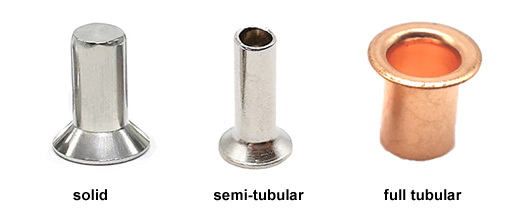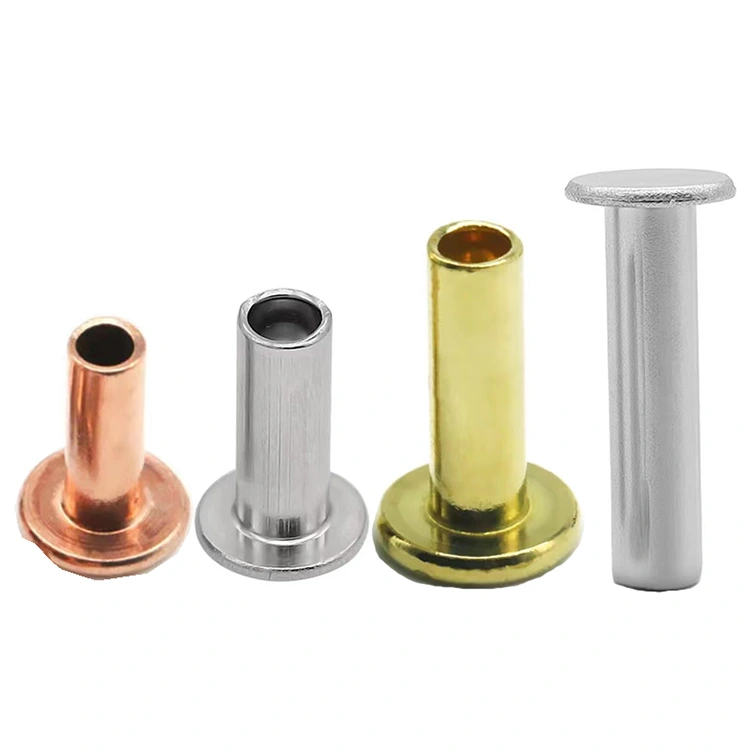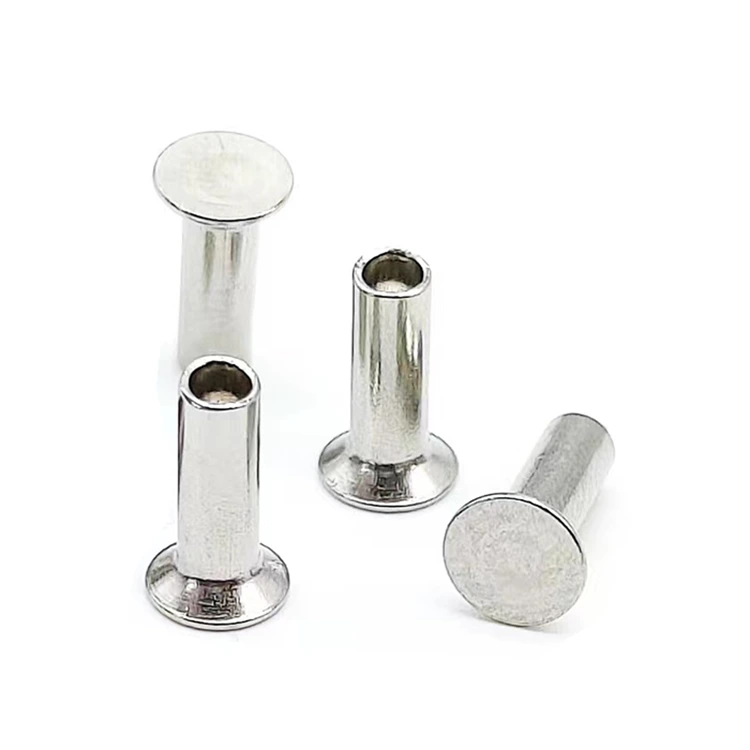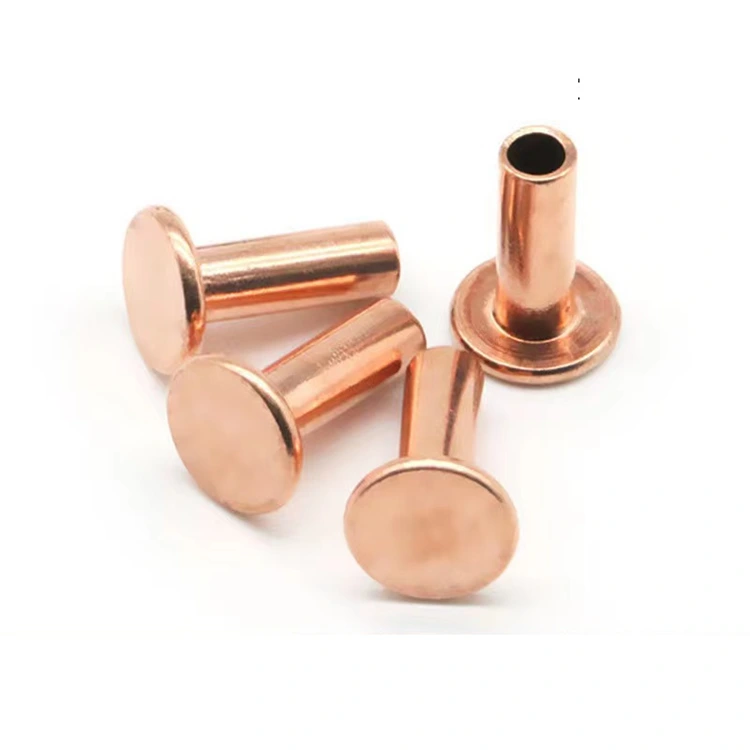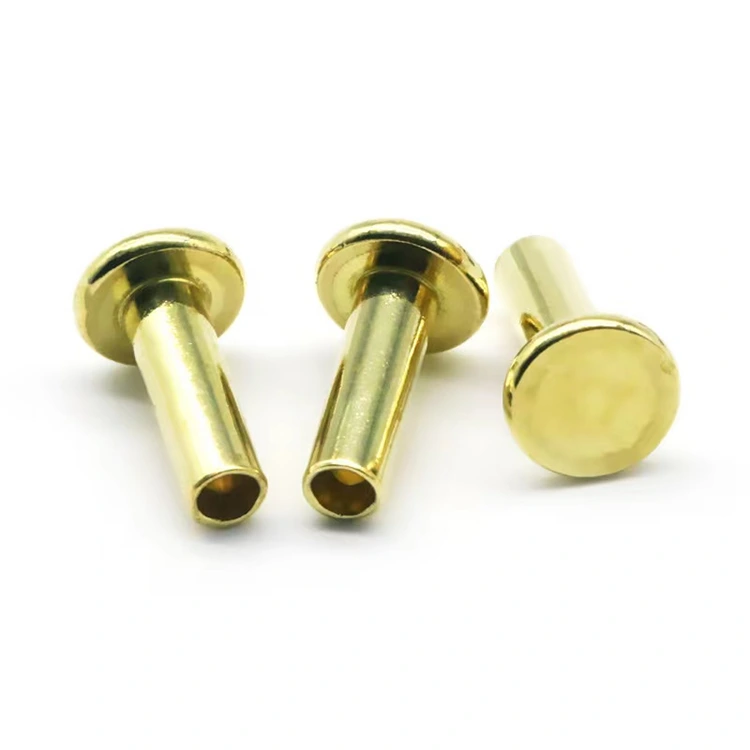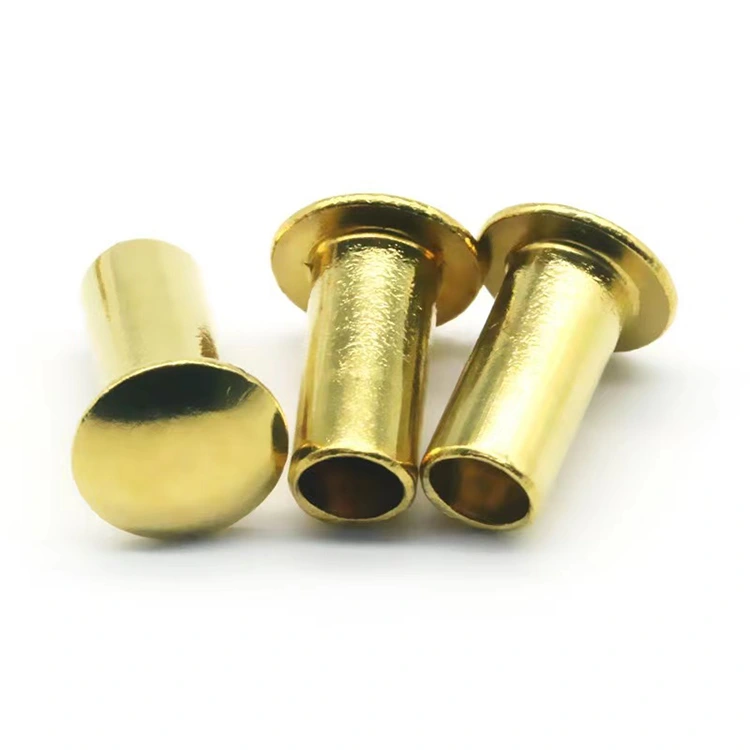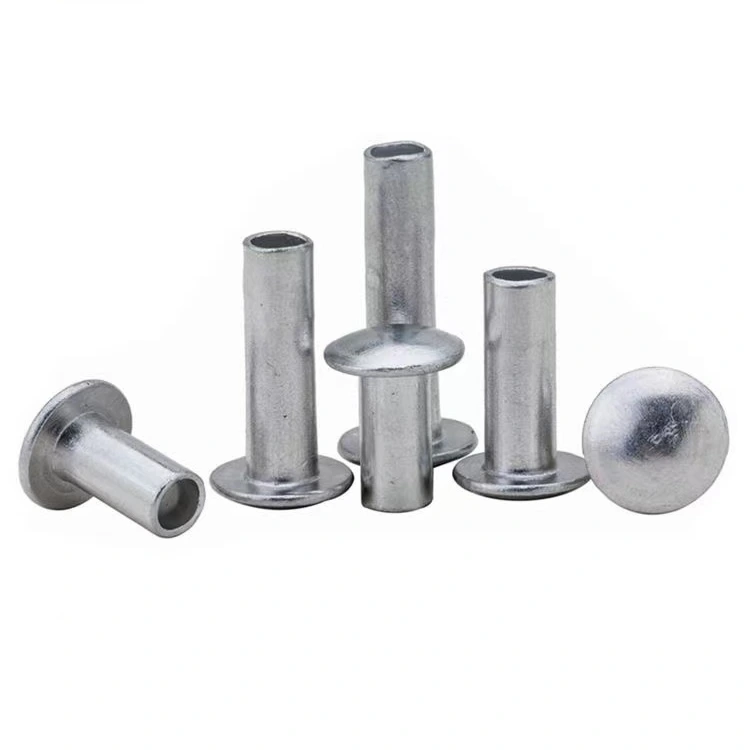Rivetti
As one of professional manufacturer in China, Notin would like to provide you Rivets. And we will offer you the best after-sale service and timely delivery.
What is a rivet?
A rivet is a permanent mechanical fastener used to join two or more materials. Rivets work by inserting a metal pin into an aligned hole and deforming the end, creating a strong, secure, and durable connection. Unlike temporary fasteners like screws, rivets do not rely on threads, but instead form a permanent connection, making them ideal for applications requiring high strength, durability, and vibration resistance.
Classification of Rivets
Rivets are typically categorized by head shape, degree of hollowness, or material.
Based on head shape, rivets can be classified as flat head rivets, round head rivets, countersunk head rivets, mushroom head rivets, universal head rivets, truss head rivets, etc.

Based on degree of hollowness, rivets can be classified as solid rivets, semi-tubular rivets, or full tubular rivets.
Based on material, rivets can be classified as brass rivets, stainless steel rivets, steel rivets, aluminum rivets, copper rivets, etc.
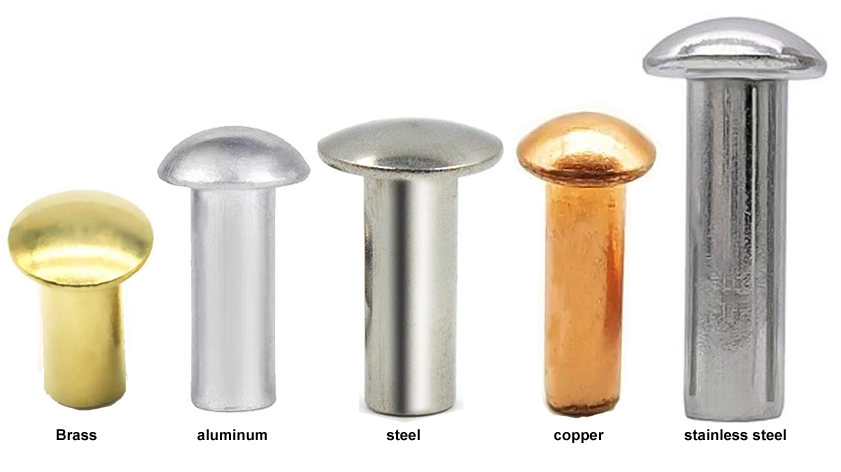
What surface finishes are available for rivets?
Rivet surfaces are typically treated with rust-proofing treatments, primarily electroplating, including zinc plating, nickel plating, chrome plating, tin plating, gold plating, and silver plating. Electroplating is a common rust-proofing method for rivets. It applies a layer of plating to the rivet surface through physical or chemical methods. The plating effectively prevents corrosion and rust, while also providing a certain aesthetic effect.
Another special surface treatment method is head coating. Head coating is performed after the rivet is electroplated. This allows for a variety of colors on the rivet head, achieving an aesthetically pleasing finish.
Aluminum rivets cannot be electroplated, but they can be anodized. Anodizing also allows for a variety of color options, but the unit price is higher than electroplating.
Rust-proofing the rivet surface is crucial, effectively extending the rivet's service life and ensuring a secure connection. Different rust-proofing methods are suitable for different environments and applications, so the choice should be tailored to the specific situation.
- View as
Rivetti semicavi a testa piatta
La rivettatura è un metodo comune per fissare insieme due o più componenti nella produzione industriale e nella manutenzione quotidiana. I rivetti semicavi a testa piatta sono un tipo di rivetto che offre vantaggi applicativi e di design unici. Nuote Metals è un produttore professionale di rivetti semicavi a testa piatta. La nostra sede è a Dongguan, in Cina, e disponiamo di abbondanti risorse per il trattamento superficiale e di trasporti convenienti, che riducono i costi di produzione dei rivetti.
Per saperne di piùInvia richiestaRivetti semicavi a testa svasata
I rivetti semicavi a testa svasata sono un tipo speciale di rivetti, chiamati per il loro design strutturale unico. "Svasato" significa che la testa del rivetto è a filo o leggermente al di sotto della superficie di collegamento dopo l'installazione, creando un aspetto liscio ed evitando l'inconveniente o il pericolo di parti sporgenti. "Semi-cavo" si riferisce alla struttura interna parzialmente cava del rivetto, che consente un fissaggio rapido ed efficiente utilizzando strumenti specializzati durante l'installazione.
Per saperne di piùInvia richiestaRivetti semicavi in rame
Conosci il rame: è quel materiale affidabile che non ti delude mai quando hai bisogno di una grande conduttività elettrica e termica. Ecco perché i rivetti semicavi in rame sono una scelta così solida: combinano i punti di forza naturali del rame con un design semicavo intelligente che porta a termine il lavoro. Qui a Nuote Metals, questa è la nostra specialità. Siamo diventati la fonte affidabile di questi versatili rivetti in rame che continuano a comparire in sempre più usi industriali. Il nostro team comprende diversi ingegneri che producono rivetti da oltre dieci anni. Siamo davvero orgogliosi del nostro lavoro: ogni singolo rivetto riceve un'attenta attenzione dalla progettazione dello stampo fino al prodotto finito. Siamo piuttosto esigenti nel garantire che ogni dettaglio sia perfetto.
Per saperne di piùInvia richiestaRivetti mezzi tubolari in ottone
rivetti semitubolari in ottone: sono come quei fidati elementi di fissaggio in metallo con un nucleo cavo che arriva circa a metà. Li produciamo in ottone, che è fondamentalmente una miscela di rame e zinco. La cosa fantastica dell'ottone è che non arrugginisce facilmente e può sopportare veri colpi. Ecco perché troverai questi piccoli cavalli da lavoro un po' ovunque. Dai un'occhiata da vicino a uno di questi rivetti e vedrai due parti semplici: la testa che poggia sulla parte superiore e il gambo che sporge attraverso qualunque cosa tu stia unendo. Ora ecco la parte intelligente: quel centro cavo nel gambo. Quando imposti il rivetto, questo è ciò che fa svasare il fondo e stringerlo saldamente. Una volta dentro, non andrà da nessuna parte.
Per saperne di piùInvia richiestaRivetti semicavi in ottone
Nuote Metals è specializzata nella produzione di rivetti semiforati in ottone. La nostra azienda si trova a Dongguan, in Cina, una città dal clima caldo e un fiorente settore industriale. I rivetti semicavi in ottone sono ampiamente utilizzati nella produzione industriale e nella vita di tutti i giorni. Realizzati in ottone, possiedono specifiche caratteristiche strutturali e funzionali. Questi rivetti sono un attore chiave in innumerevoli settori. Nel corso degli anni, il loro design e il modo in cui sono realizzati sono stati perfezionati, trasformandoli in un componente indispensabile per molti prodotti.
Per saperne di piùInvia richiestaRivetti semicavi in alluminio
I rivetti semicavi in alluminio sono fondamentalmente elementi di fissaggio realizzati in lega di alluminio. Hanno una testa solida e una coda parzialmente cava. Quando li installi con uno strumento speciale, la sezione cava si allarga e si arriccia all'indietro, creando un giunto davvero forte e bloccato. Poiché sono in alluminio, sono naturalmente leggeri e non arrugginiscono facilmente, il che è un grande vantaggio quando sei preoccupato per il peso o se li usi in ambienti difficili. Quando li confronti con rivetti realizzati con altri materiali, raggiungono davvero il punto debole tra l'essere convenienti e le buone prestazioni.
Per saperne di piùInvia richiestaWhat are the advantages of rivets over other fasteners?
1. Ease of Installation
Rivets are fast to install, and even fully automated for high-volume applications, resulting in a simple and efficient operation process.
2. Connection Reliability
The riveting process is standardized, with strict quality control, resulting in highly stable connections. Visual inspection allows for quick verification of connection quality.
3. Vibration and Impact Resistance
Rivets connect through deformation or interference fit, providing strong clamping force and excellent vibration resistance, capable of withstanding vibration and shock.
4. Low Cost
Rivets are easy to install and can be fully automated, saving significant labor costs.
What are the advantages and disadvantages of rivets made of different materials?
Aluminum Rivets
Advantages: Lightweight, reduces overall product weight, low cost, suitable for general civilian applications.
Disadvantages: Low tensile and shear strength, unsuitable for high-strength workpieces, prone to electrochemical corrosion when in contact with metals such as stainless steel.
Stainless Steel Rivets
Advantages: Strong corrosion resistance, high hardness, suitable for high-strength workpieces (such as marine equipment)
Disadvantages: Higher cost, typically more expensive than aluminum rivets of the same specification.
Brass and Copper Rivets
Advantages: Excellent conductivity (such as connecting electronic components), good corrosion resistance.
Disadvantages: Higher cost, more difficult to process.
Steel Rivets
Advantages: High hardness, high connection reliability, and wide applicability.
Disadvantages: Compared to other materials, iron rivets are more prone to rusting.
What are the main applications of rivets?
Rivets have a wide range of uses, from small items like a pair of scissors to large items like airplanes and ships, as well as in high-precision medical applications.
Industrial Manufacturing
Rivets are used in a wide variety of industrial fields, wherever there is a need to connect two or more materials.
Electronics
Rivets secure heat sinks and chips, providing both vibration damping and noise reduction, and are widely used in the cooling systems of electronic products such as computers and mobile phones.
Automotive
Rivets are widely used to connect components of automobile bodies and chassis, such as doors and hoods. Their lightweight and corrosion-resistant properties make them an indispensable joining method in automotive manufacturing.
Aerospace
In aircraft manufacturing, rivets are used to connect different fuselage components, such as wings and tailplanes. Millions of rivets create high-strength, corrosion-resistant joints. Aluminum and titanium alloy rivets are often used to connect components of corresponding materials, ensuring stability in extreme environments.
Rivets are used everywhere. The above examples only represent a small number of their applications. We see rivets everywhere in our daily lives, such as on scissors, folding beds, and strollers etc. Rivets can be customized to different sizes and materials depending on the application.
Nuote Metals has specialized in the rivet industry for over a decade. Our factory is located in Dongguan, a city known as the "World Factory," a city with a developed industry and convenient transportation. This allows us to respond quickly when acquiring raw materials and supporting surface treatments, meeting our customers' needs for quick access to samples and bulk orders. We produce 10 million rivets daily and have molds of various specifications, allowing us to produce rivets as small as 0.8mm and as large as 10mm. We welcome your inquiries and visits.






